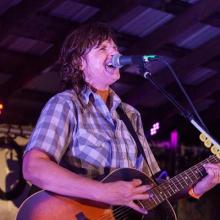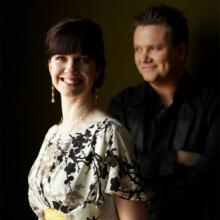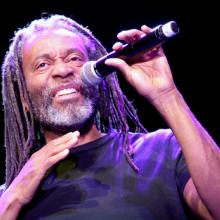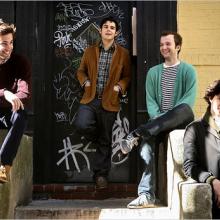Music
I love Fun.. I especially love the wacky period at the end of the band’s name. But my Word doc has the green squiggly line under the two periods of that first sentence. I hate that green squiggly line — it’s not fun. It’s there to tell me that I have bad grammar. Not this time, Word doc! I shall right click and ignore you!
Fun.’s (okay, now there’s a red line! Once again I shall ignore…) Some Nights is full of philosophical and spiritual gold. It asks questions about identity, friendship, violence, and the purpose of life. But, for me, these words stand out the most:
My heart is breaking for my sister and the con that she calls “love”
When I look into my nephew’s eyes…
Man, you wouldn’t believe the most amazing things that can come from…
Some terrible nights…ah…
Amy Ray’s smile opened itself to wrap love around the couple thousand fans who’d weathered a soggy soaker of a spiritual festival to wait for their 10 p.m. Saturday set. “Y’all have advanced way past kum-bah-yah,” she quipped. “That was a deep album cut.”
For 90 minutes, Ray and her musical partner Emily Saliers couldn’t stop praising the Wild Goose Festival crowd. It’s as if they’d trekked to the misty mountains of western North Carolina just to see us render their greatest hits the new hymnal for progressive and inclusive Christianity. The stellar setlist covered all the ground, a collection of tracks both new and old spanning a career that jump-started itself in the same 1980s Georgia music scene that gave us the likes R.E.M. and Widespread Panic.
The Indigo Girls catalog knits itself into our daily lives in such a way to make them the perfect band for a campfire singalong at a radicals’ revival like this. But what else was obvious here could not be pinpointed in the mere practice of song. The best-selling grassroots folk duo found something in our makeshift festival that’s been true of their career — past all the great lyrics and legacy of activism, past the DIY-ethics and indie entrepreneurs' edge, past all the albums and compilations, past all the accolades — exists the chewy center of hope. We see the Holy Spirit at work in such a down-to-earth humbling and fiery fashion. The Indigo Girls headline set at Wild Goose 2013 healed the audience and sealed the festival’s cultural location in a jubilant justice movement for ecumenical and evangelical convergence on the funky fringes of mainstream Christianity.
Troy Bronsink’s meditative live album Songs to Pray By stretches its sonic arms to embrace every listener with expansive words of spirited awe and awesome humility, with ecstatic waves of audio grace and rhythmic gravity.
Bronsink and his band bring to church what we’ve seen out on the festival circuit for years: a shimmery and psychedelic use of sound and language to elevate listeners who choose to inhabit a song as if it were wings, the place where the spirit soars and the heart sings. We don’t often associate noodly guitars and trippy percussion with the worship sound, which is exactly why this album is such a perfect addition to the praise genre.
A solo Bronsink will be presenting his musical work tomorrow at the Wild Goose Festival. We both took a break from packing and planning our journeys to North Carolina for this email interview.
Fans of a beloved contemporary Christian hymn won’t get any satisfaction in a new church hymnal.
The committee putting together a new hymnal for the Presbyterian Church (USA) dropped the popular hymn “In Christ Alone” because the song’s authors refused to change a phrase about the wrath of God.
The original lyrics say that “on that cross, as Jesus died, the wrath of God was satisfied.” The Presbyterian Committee on Congregational Song wanted to substitute the words, “the love of God was magnified.”
The song’s authors, Stuart Townend and Nashville resident Keith Getty, objected. So the committee voted to drop the song.
I’m excited to share this mixtape in honor of the Wild Goose Festival, Aug. 8-11 in Hot Springs, N.C.
For the festival proper, this third one will surely be a charm. But for me, it’s the second time around, hence the title of this playlist, also taken from an Indigo Girls song. Getting ready for a music festival for me requires hours upon hours of research: buying and downloading mp3s, studying sounds with the headphones on. These are just a few favorites I’ve found and suggestions for your weekend—mixing up the indie-folk with the psychedelic-liturgical with the pop-folk and power-pop.
The mixtape works like a storybook of sonic massage on the ears, guts, and heart. My prayer is that your listen will provide at least a sliver of the joy that making it offered. Hopefully you can allow this mix to accompany your packing routine or en route roadtrip. See you at the shows! Or if you cannot make it, hopefully these songs will remind you why you wish you could.
The Dream at 50
This August marks the 50th anniversary of the historic March on Washington for civil rights for African Americans. PBS will feature special broadcast and Web programming, including the premiere of the new documentary The March onTuesday, Aug. 27 (check local listings). pbs.org/black-culture/explore
The Miracle of Meaning
Secular Days, Sacred Moments: The America Columns of Robert Coles, edited by David D. Cooper, collects 31 short essays by the respected child psychiatrist and Pulitzer Prize-winning author. Whatever the topic, Coles offers thoughtful insights on civic life and moral purpose. Michigan State University Press
At the 2012 Wild Goose, for an afternoon set at a tent tucked away on the backwoods of the festival site, a young North Carolina band blew minds and won fans. More than just a band — more like a multicolored movement of sonic jubilee — David Wimbish and the Collection carry the celebratory consciousness, lyrical significance, and live energy that have made bands like Mumford & Sons or Edward Sharpe & the Magnetic Zeros the darlings of the current folk-pop moment.
In August 2013, the Collection will open this year’s festival on the main stage with a Thursday night set sure to thrill us. Then, they will support Phil Madeira’s Friday night set. In the meantime, the Collection are furiously raising funds on Kickstarter for their next album, a surprisingly hopeful take on death called Ares Moriendi. I recently caught up with David Wimbish and convinced him to take a break from writing, recording, fundraising, and preparing for Wild Goose to answer a few questions.
Oddly enough, whenever I think about eternal life, Animal Collective come to mind.
That might — well, almost certainly will — need some clarification because, as many Christians might be quick to point out, shouldn’t Jesus be the first person that comes to mind, or maybe living on some clouds in a golden city or something?
Yes and no. What comes to mind when I think about eternal life is painted by Frederick Buechner’s entry on the subject in his book Wishful Thinking, which I studied for a class in college. Buechner takes religious terms and eloquently and poetically explores what they might mean.
Have you not known? Have you not heard? Has it not been told you from the beginning? Has it not been told you from the foundations of the earth? You shall have a song and gladness of heart.
Or something like that.
I have been talking to a friend lately about the nature of achievement. We have been talking about money and art and what it means to care for oneself and the concept that human beings deserve to be happy. Or, more accurately, deserve to get what they want. Being happy and getting what you want are not always the same thing. Of course, you knew that already.
He’s best known for his iconic 1980s feel-good hit “Don’t Worry, Be Happy,” but Grammy-award winning artist Bobby McFerrin explores a deeper side of life in a new album.
Titled spirityouall, the recording includes his adaptations of traditional African-American spirituals and devotional songs that he composed.
McFerrin believes music has a transcendent spiritual power.
“Listen to the words,” the young woman behind me stage-whispered to her chatty date. “Are you listening?”
He wasn’t. But I was and so was most of the rapt, standing-room-only crowd that crammed the Greek Theatre at UC Berkeley for the second of three sold-out Mumford & Sons concerts late last month.
This is what I had come for — not just a concert, but a shared experience with a congregation of strangers (and a few friends).
Vampire Weekend are a little like a college-educated version of the rich young ruler in Mark 10. I say a little because, despite the fact that they have gotten flack for being “privileged, boat shoe and cardigan loving Ivy League graduates,” the New York-based foursome actually probably aren’t as wealthy as skeptics think, and the late 20-somethings probably haven’t been as straight edged as the rich young ruler. I mean, they’re rock stars. And even though they went to Columbia University, rock stars aren’t widely renowned for their moral rigidity.
But on Vampire Weekend’s third album, Modern Vampires of the City, which was released last month to critical acclaim and commercial success, we find lead singer Ezra Koenig asking honest questions of God, much like the young ruler.
On this album, the third in what Koenig sees as a trilogy, Vampire Weekend manage to mature their poppy, eclectic sound, drawing from all sorts of genres and international songs — as they normally do — but also exploring deep questions of morality, love, faith, and belief in complex ways.
A couple of weeks ago I posted about Mumford and Sons. I suggested that the Wednesday concert was, for me, a festival of devotion. Friday's concert, however, was something else. It was an eschatological event. Not transcendent, though others have used that word to describe it, but immanent, apocalyptic, eschatological. There we were gathered all in one place, as the Bible story goes, and the place exploded. Cathleen said more than once that the Holy Spirit was present. I love it when shows differ from night to night. I love it when the audience brings something new. I also wonder how such a noticeable distinction at a concert can be a helpful reminder for all of us who plan liturgies.
My wife is an actress. She will do the same show five or six times a week for six to eight weeks. The same play. Every night. But what she will also say is that it is never the same play every night. Actually, she has said that if you do it right it should never be the same piece twice. There is no such thing as a repeat performance if one understands repetition is not exact duplication.
Similarly, a live concert is not a track on a CD. One does not show up to a concert and press "play." No, it is a singular performative event. Even when, as with Mumford and Sons, the set list is similar and the choreography (yes, even Mumford and Sons have a couple of staged bits) is the same, the concerts still feeldifferent. Why? Well lots of reasons, but mostly because they are different.
The ONE Campaign, co-founded by music legend Bono of U2, has launched a new platform to promote global messages of social justice, women’s rights, and putting an end to apartheid, war and poverty — just to name a few.
The campaign, agit8, features new covers of famous protest songs throughout history by contemporary musicians ranging from Mumford & Sons to Greenday.
With the stated goal of ending poverty by 2030, agit8 is timed to coincide with the upcoming G8 summit next week. Noting the impact protest music has had on American history, agit8 encourages artists to “get on their soapbox” and amplify “the voices of those who spoke up for social change throughout history.”
Mumford and Sons opened with a little introit called "Sigh No More" then a call to worship, "Roll Away Your Stone" and so we did. Understated and, dare I say it, reverent. Polished and yet still "honest" (this is a hipster liturgy, after all), the boys did a great job offering their work to us. They spoke with the audience. Marcus jumped off stage to give a beer to a woman celebrating her 21st birthday and then led the crowd in singing "Happy Birthday" to her. Welcome to a living room that seats 8,500.
The band played most of their published stuff, took a bow, and walked off stage. The encore set is what took it home for me. The stepped away from their usual set-up, unplugged their instruments, stood around a condenser mic and then sang. They dragged us back into devotion. Springsteen's "I'm On Fire" followed by "Sister" sung a cappella did me in. A benediction? Perhaps I'm reaching.
They closed the night with "The Cave" which had people jumping and singing along. You can find a set list here.
After the concert, my Facebook feed lit up with "it was just like church" or "that was church" by several people including some ordained church types in attendance last night. The Vineyard background has not been wasted, not by any stretch. It has been given a new venue, a new form, a venue where the truth can be sung in quiet tones, where no name is taken in vain or otherwise, where wild passion is replaced with festal devotion.
Growing up Roman Catholic in Newfoundland, Matt Maher never imagined that his childhood interest in music would lead to a career as a Grammy-nominated, chart-topping Christian rocker — let alone a crossover artist featured on Christian radio and in evangelical worship.
After he stopped going to Mass as a freshman in high school, Maher wasn’t even sure about his own faith. The idea of maintaining a personal relationship to God seemed a foreign concept.
“Where I grew up, evangelical Christianity really hadn’t made any strides,” said Maher, now 38, describing the mainline religious culture of his wind-swept Canadian homeland.
Listen to any of his catchy, guitar-driven pop-rock anthems, such as his new single, “Lord, I Need You,” and it’s clear God is never far from Maher’s mind these days.
Passion and purpose.
Sounds familiar, huh? Those two words are at the heart of activism and social justice. I could have safely assumed that almost every young Christian activist at the Justice Conference in Philadelphia back in February was passionate about a particular purposeful cause. I’m surprised a Christian conference hasn’t already picked up on the whole passion and purpose thing for slogan or tag line.
Christian conferences aside, I never thought those two words would be the foundation of a cutting-edge music and food festival at Merriwewather Post Pavilion, and certainly not one where 18,000 people were jamming to some of their favorite artists and scurrying over to local food trucks for healthy, delicious food in between sets. Heck, I didn’t know there was such a thing as a festival that focuses on both music and food.
I don’t know how I feel about liberalism or capitalism beyond the degree to which I participate in both by necessity. But I do know what I perceive as the source of my activism and Bono’s: Jesus and the Bible; spirituality and scripture; the new commandments of radical love and service taught by the carpenter from Nazareth. What’s been called the preferential option for the poor. Bono’s lack of economic literacy, or worse, allegiance to wrong-headed economic mentors, may make me and others uncomfortable and may play into the hands of the problem-creators rather than the problem-solvers, yet Bono’s Biblical, musical, and poetic literacy remain on target in my eyes and heart.
In 2005 just after How To Dismantle An Atomic Bomb, as much as I loved that record and the subsequent Vertigo tour, part of me wanted to give up on Bono for his self-imposed public silence on the Iraq War, for hanging so intimately with people like George Bush and my then least favorite Tennessean Bill Frist. That year, I picked up Bono: In Conversation with Michka Assayas. Not only does the front man answer all his critics in a nuanced manner, he diminishes and self-deprecates his own significance. The alleged egomaniac also has a streak of deep and deferential humility.
But more than that, he speaks ever so elegantly and evangelically about his faith in Jesus and how Christian religious perspective, spiritual practice, and central Gospel narrative inform everything he does. Like Bono, I am no economist, but also like Bono, I take seriously the Biblical teachings about poverty and justice.
IF YOU GREW up like I did—surrounded by PraiseGathering devotees and with Gaither Family VHS tapes stacked on the home entertainment system shelves—you probably have a frame of reference for Douglas Harrison’s Then Sings My Soul. If you weren’t raised on such a specific Bible Belt diet of white male quartets and singspirations, Harrison’s use of the term “Southern gospel” may initially seem confusing, if not meaningless.
According to Harrison, Southern gospel wasn’t labeled as such until the 1970s, and the label didn’t catch on with mainstream audiences until the 1980s. Before then, all genres of gospel—sacred music spanning regions, decades, ethnic heritages, and faith-based traditions—were given the broad label. As Harrison defines it in what is arguably one of the first contemporary attempts to do so, Southern gospel is a participatory style descending from a “post-Civil War recreation culture built around singing schools and community (or ‘convention’) singings popular among poor and working-class whites throughout the South and Midwest.” While he notes that most rigorous investigations of gospel’s longevity and legacy refer to black gospel, Harrison departs from this framework and instead focuses on the likes of the Blackwood Brothers Quartet, The Cathedrals, and gospel impresario Bill Gaither, pasty proselytizers without whom the 20th century gospel movement would not exist.
Harrison has been blogging (at averyfineline.com) about Southern gospel for the past decade, during which he’s showcased his deep knowledge and fondness for the genre’s mid-tempo nostalgic modernism, a retro style performed without irony by up-and-coming artists. His is an outsider’s, nonbeliever’s ode to professional, commercialized gospel entertainment, a style attributed to a variety of performers. “Southern gospel was what Elvis Presley really wanted to sing,” Harrison notes. He goes on to identify Southern gospel’s evangelists as a cluster of record and distribution labels, organizations such as the National Quartet Convention, and the Gaither Homecoming phenomenon (including videos, music recordings, concert tours, and even cruises under that branding), all of which share a common historical, economic, social, and cultural heritage.
I first got wind of Stornoway back in 2011 when Izzy Westbury was president of the Oxford Union during the Michaelmas term of 2011 at Oxford University while studying abroad. The group of Oxford natives were Izzy’s favorite band at the time, and she made sure to give them a chance to play that I regretfully passed up to grab a pint with some friends.
So when the opportunity arose to see Stornoway in Washington, D.C., envelope myself in Oxford nostalgia, and enjoy some good tunes, I couldn’t pass it up.
And Stornoway delivered with hopeful, honest songs about life, love, and everything in between. Delightful is probably the best word to describe their music and the experience of seeing them live. It’s like taking a deep, refreshing breath. The British quartet mix elements of beach boys-esque pop with fleet foxes’ harmonies and a low fi, organic feel.



















